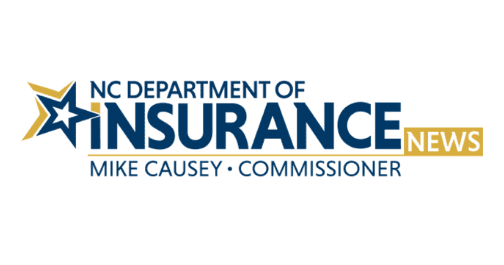N.C. Insurance Commissioner Mike Causey and his team at the Department of Insurance are advocates for consumers when it comes to claims disputes or proposed rate hikes for automobile or home insurance.
But it was when Causey was trying to call attention to the health of first responders that he got his own wake-up call, and it probably saved him from a heart attack.
At the request of a fire association in the western part of the state a couple of years ago, Causey agreed to have one of those body scans – a sort of ultrasound – to kick off a health program that was going to be offered to local first responders in the area.
Too many firefighters come back from a fire call or from training and subsequently suffer heart attacks, he said, and he said he was happy to promote health and wellness among those first responders who provide a vital service in their communities.
The body scans “check to see if you’ve got any problems,” he said on Wednesday’s TownTalk and when they got to his heart, “they noticed that something was not quite right with one of the valves.”
Most likely, he’d had it since birth and had been living symptom-free. He has since recovered from a surgery last month to correct the problem and Causey said he’s good as new with heart health restored.
He also pronounced healthy the state’s insurance market, noting that North Carolina enjoys lower rates than many other states.
“We’re probably the healthiest and most stable insurance market in the country,” Causey said, adding that our auto insurance rates are some of the lowest in the nation.
That doesn’t change the fact, however, that some people in the state are paying high rates for automobile insurance, he said, as a result of individual driving records or other factors.
“There’s a lot of upward pressure in every state to raise car insurance premiums,” Causey said. He cited four main factors that drive up rates: distracted driving, speeding, driving under the influence of alcohol or drugs and not wearing seatbelts.
Number one is distracted driving, he said. There are too many people texting and driving, causing accidents that sometimes are deadly.
“If we could get people to put down their cell phones, keep both hands on the wheel and pay attention, we’d be better off,” he said.
More people are speeding these days, and whether they’re zipping along the interstate or two-lane roads, it’s a problem. More people are driving under the influence of alcohol or drugs, too. And he said it’s hard to believe, but too many people in vehicles just aren’t buckling up.
All those factors can contribute to drivers and passengers being injured in car crashes, but higher vehicle prices also plays a role in increased premiums.
A tap on someone’s bumper could turn into a $2,000 or $3,000 repair, he said.
“The bottom line is people’s driving habits,” Causey said. “As long as people are driving recklessly and speeding and having accidents, it’s going to keep driving up the cost of insurance.”
Western N.C. Hurricane Relief
Causey said the Department of Insurance has had a presence in western N.C. since Helene’s devastating flooding, and he said there’s been “tremendous improvement” especially with road and highway repairs. With the current threat of wildfires, that part of the state continues to face challenges.
“We go from floods to wildfires,” Causey said. “Whether you lose your home to a wildfire or a flood, it’s still a loss.” Very few of the homeowners had flood insurance, which means “they got zero unless there was some other damage to the house.”
He said he participated in a roundtable discussion back in the fall that took place in Washington, D.C. convened by FEMA and the Treasury Department to hear about the federal response to Helene.
“The big problem is the flood insurance,” Causey said, adding that there needs to be some way to have policies include damage from floods.
The Department of Insurance offers help to consumers – visit www.ncdoi.gov or call 855.408.1212 toll-free to learn more.
CLICK PLAY!
